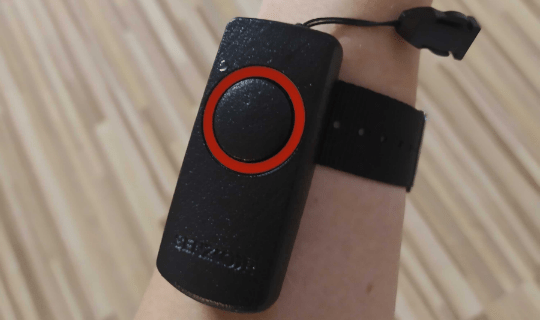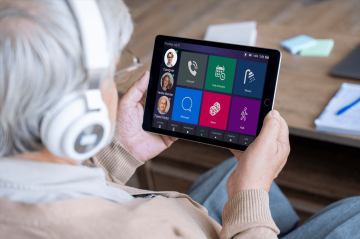New Approaches of Taking Care of Seniors
February 2, 2022

As adults age, it may become apparent that they need extra help with their daily activities, like going to the grocery store or attending doctor appointments. The growing adult population has ever-changing needs that caregivers must work hard to meet. Some adults need to take medications daily. Others have mobility issues, making it challenging to get around the house or up the stairs. Let's explore some of the new approaches being used to help older adults live independently and maintain a high quality of life.
Emerging Caregiving Trends
The past few years have been tumultuous due to the COVID-19 pandemic. The virus spread through nursing homes and assisted living facilities across the country, which exposed the health care system's shortcomings. It was clear that those above the age of 65 were at a higher risk of experiencing severe symptoms of the virus.
The issue is that by 2030, more people will be older than 65 compared to the population younger than five. The health care system must find ways to manage the complex nature of aging. Thankfully, with each new year comes new trends in caregiving that those who work with older adults should know about.
With these new challenges to overcome, caregivers have their work cut out for them. Along with the new normal, there are recent trends in the caregiving industry that are emerging. Let's discuss some of these trends below.
1. Caregivers are using positivity to fuel their approach
In one adult care facility in Hillsborough, North Carolina, caregivers took to TikTok to share their positive approach to caring for patients with dementia. They found that using music, rhythm and positivity have improved patient outcomes. The caregivers in the Florence Gray Soltys Adult Day Health Program have shared their experiences providing care and even went viral for it.
There's no denying that treating older adults who need extra care with kindness and respect is something all caregivers should prioritize. Rather than being demanding or stern, caregivers can reach their desired outcomes by being empathetic, compassionate and caring.

2. Technology is being used to improve caregiving techniques
All types of caregivers will benefit from emerging technologies, such as artificial intelligence (AI), the Internet of Things (IoT) and other technologies. Some of the benefits of IoT in health care, for instance, include decreased costs, improved patient outcomes, reduced errors, improved patient experiences and more data to work with.
Evidence suggests that many older adults would like to age in place, and technology, such as automatic pill dispensers and in-home sensors, can help make aging in place simpler for older adults. This also opens up more opportunities for the home health technology industry.
Additionally, robotic pets that offer companionship will revolutionize care for seniors. We can expect to see higher adoption rates of these technologies in the future.
3. Home care delivery models are shifting
COVID-19 accelerated the growing trend of home care delivery. In other words, more older adult patients are showing interest in receiving care at home as opposed to in a living facility.
Hospitals will also begin to offer in-home services, especially for patients with extremely limited mobility. Older adults who are diagnosed with cancer, for example, may be able to receive treatment from the comfort of their own home, mainly because exposure to the COVID-19 virus is too risky.
In both basic health care and senior health care, adopting telehealth treatment methods has now become the norm. Delivering quality care to patients is likely to increase patient outcomes, satisfaction and experience.
These three trends highlight only a few of the changes that caregivers can expect to see in the next few years. However, caregivers need to be aware of these changes to meet changing patient needs in the future.
Senior Caregiving Will Continue Evolving
Caring for seniors will remain a hot topic in the years to come, especially with the COVID-19 pandemic presenting new obstacles for caregivers worldwide. Whether adopting the latest home health tech or becoming more skilled in treating serious medical conditions, caregivers play an integral role in supporting older adults.

Shannon Flynn - Managing Editor at ReHack
With over 4 years of writing and editing experience, Shannon focusses on covering topics like medical, health, and lifestyle technology.
Keep reading:
Aging in the AI Age: How Technology is Redefining Senior Care
Discover how technology is transforming senior care in the AI Age. From remote health check-ins to cognitive stimulation and combating loneliness, this article explores how Oscar Senior helps care organizations deliver smarter, more connected, and compassionate care — with tools that are simple, accessible, and ready to use.
Oscar Senior + CogniEnhance
Oscar Senior has announced a new partnership with CogniEnhance, a leading cognitive stimulation platform. This collaboration brings personalized brain training into Oscar Senior’s digital care environment, helping organizations improve mental wellbeing, engagement, and independence among older adults — all within a seamless remote care experience.
Press Release: Oscar Senior Secures 1 Million USD in Funding for Oscar Family App and Tablet Bundle
Oscar Senior, a leading digital solutions provider focused on enhancing the lives of seniors and individuals with disabilities, proudly announces a significant financial milestone concurrent with the launch of Oscar Family. In a successful funding round, the company secured 1 million USD to support the innovative Oscar Family app bundled with a Samsung tablet.



